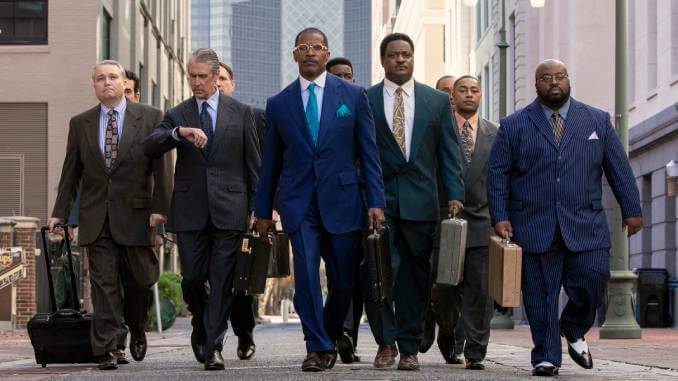Jamie Foxx Dominates The Burial‘s Dull, Feel-Good Legal Case

The throwback appeal of The Burial, a thin courtroom drama with a sense of humor and a righteous streak, is rooted in the same place as its failures: Its familiarity. Set in the heart of the ‘90s, a few years after The Firm would top the box office, The Burial tackles quintessential American issues (racism, capitalistic exploitation, the gray areas of a flawed legal system) in a quintessentially American way (superficially feel-good).
You probably don’t know this case, but you know this story, and how it’s told. Based on the lawsuit between local Mississippi funeral director Jeremiah O’Keefe and massive funeral corporation the Loewen Group, The Burial goes through the David and Goliath motions, but its sling is empty. Some will still cheer the brief victory of the little guy, shocked to life by Jamie Foxx’s magnetic, relentless monologues. Some will still welcome the easy genre cliches. But aside from Foxx, The Burial is as lifeless as a mortuary—even if it’s got the family-owned moral high ground.
Foxx’s Willie E. Gary, an electric, wealthy, self-made Black personal injury lawyer, never gets quite as much time in the spotlight as you’d hope, despite being the unlikely choice for the lead counsel of elderly, taciturn, white O’Keefe (Tommy Lee Jones). The subgenre of Crotchety White Guy Bumps Fists With Cool Black Man should’ve been snuffed out before it began, but, in keeping with the film’s outdated feel, it’s proudly on display. From the insultingly thin character of up-and-coming lawyer Hal Dockins (Mamoudou Athie)—whose sole functions are to be the target of racism from O’Keefe’s original attorney (Alan Ruck) and O’Keefe’s Black liaison to Gary—to the hammered-home iron spine of the racially progressive (or at least not extremely racist) O’Keefe, race is mounted as the uneven centerpiece of the otherwise dry contract case at hand.
The second feature from director Maggie Betts (a filmmaker familiar with both the country’s upper crust and, presumably, its underlying racism), who adapted Jonathan Harr’s New Yorker story on the case alongside Pulitzer-winning playwright Doug Wright, goes broad. While the real case was a detailed, complex battle over insurance sales rights and the looming threat of a single entity having a monopoly on American death, The Burial breaks it down as such: Not only is a huge company snapping up funeral homes, but they’re doing so—like all things in America—at the expense of poor, non-white people.
Focusing on race as a legal launchpad for larger arguments against the economic powers that be is savvy, as the dispute is being heard in a Black county in Mississippi, where one can expect a Black jury and a Black judge. And, on its face, it’s a sharp storytelling move too, because (in addition to this tactic having been a smash success in real life) it makes a business showdown accessible through its spotlight on the interconnectedness of race, wealth and the law.
Gary and his opposing counsel, Mame Downes (Jurnee Smollett), drive this point home when discussing the ongoing O.J. Simpson trial. But, like so much of the movie’s brushes with thematic depth, it’s just namechecked, a reference to an idea rather than the idea itself. It can come close—Is it really O.J. who’s on trial?—but Betts and Wright always pull out early, veering off into weird flirtations or half-hearted punchlines. Much of the script follows this structure, either outlining drama that is never filled in later, or leaning on filler lines given life through the performers’ sheer force of will.
Before Downes is introduced, for example, O’Keefe’s team discusses her reputation. Apparently, they call her The Python because, on cross-examination, she strikes when you least expect it (not what pythons do). Well, if she’s The Python, Gary reasons, then he’s The Boa Constrictor (a less impressive snake and not what they do either). I’m no serpentine Neil deGrasse Tyson, but this kind of writing—the kind that sounds sharp until you actually listen to it—fills The Burial. It talks a lot, but it’s not saying much.
Like Gary’s legal tactics, The Burial is more about the soft sell than the hard facts. Unlike the stagey The Caine Mutiny Court-Martial, which uses its play’s contained focus to immerse us in the minutiae of the case, The Burial hits us with the context shotgun. We get stray shrapnel from the lives of O’Keefe (his huge family) and Gary (his teasing, humbling wife), while seeing much of the case’s ancillary drama—like O’Keefe striking a deal with Raymond Loewen (Bill Camp) aboard the latter’s yacht—for ourselves. The Loewen Group’s ties to the National Baptist Convention are only briefly explored as the plot’s trump card—but this direct, grounding connection to all the systemic, ingrained racism floating around in The Burial’s atmosphere, is the most worth digging into.
Some of these choices, like a lengthy opening shot following the rising climax of Gary’s closing arguments for another case, inject The Burial with much-needed visual energy. Mostly, though, it feels like it’d all be stricken from the record upon objection.
-

-

-

-

-

-

-

-

-

-

-

-

-

-

-

-

-

-

-

-

-

-

-

-

-

-

-

-

-

-

-

-

-

-

-

-

-

-

-

-








































